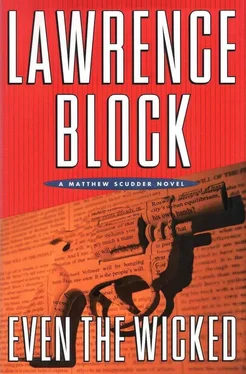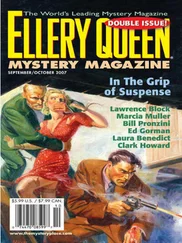It was Richard Vollmer, of course, and he’d been found hanging not far from where both of his victims had been found, and McGraw’s first thought was that the misbegotten son of a bitch had actually done what he’d told him to do. He felt a curious sense of unsought power, at once unsettling and exciting.
But Richie had had help. Asphyxiation had caused his death, so he’d been alive when the rope went around his neck, but he’d probably been unconscious. An autopsy disclosed that he’d been beaten severely about the head, and had in fact sustained cranial injuries that might have proven fatal if someone hadn’t taken the trouble to string him up.
McGraw didn’t know how he felt about that. It certainly appeared as though a column of his had led some impressionable yahoo to commit murder; at the very least, the killer had looked to McGraw for the murder method. That disgusted him, and yet he could hardly bring himself to mourn the death of Richie Vollmer. So he did what he had grown in the habit of doing over the years. He talked out his thoughts and feelings in a column.
“I can’t say I’m sorry Richie Vollmer is no longer with us,” he wrote. “There are, after all, a lot of us left to soldier on, eight million and counting, and I’d be hard put to argue that the quality of life will be a whole lot worse with Richie in the cold cold ground. But I’d hate to think that I, or any reader of this column, had a part in putting him there.
“In a sense, whoever killed Richie Vollmer did us all a favor. Vollmer was a monster. Is there anyone who seriously doubts he’d have killed again? And aren’t we all justified now in feeling relieved that he won’t?
“And yet his killer did us a disservice at the same time. When we take the law into our own hands, when we snatch up in our own hands the power of life and death, we’re no different from Richie. Oh, we’re a bunch of kinder, gentler Richie Vollmers. Our victims deserve what they get, and we can tell ourselves we’ve got God on our side.
“But how different are we?
“For wishing publicly for his death, I owe the world an apology. I’m not apologizing to Richie, I’m not for one moment sorry he’s gone. My apology is to all the rest of you.
“It’s possible, of course, that the person or persons who took Richie out never read this column, that they did what they did for reasons of their own, that they were old foes of his from his days in prison. That’s what I’d like to believe. I’d sleep better.”
McGraw had a visit from the cops, predictably enough. He told them he’d had a batch of letters agreeing and disagreeing with his column, but that no one had specifically offered to see that his wishes were carried out. The cops didn’t ask to see the letters. His column ran, and the next day’s mail brought a second letter.
“Don’t blame yourself,” McGraw read. “It might be interesting to discuss the extent to which your column prompted my action, but a search for the ultimate cause of any phenomenon is ultimately fruitless. Can we not say with more assurance that Richard Vollmer, by his monstrous actions, caused you to write what you wrote even as it caused me to do what I did? Each of us responded — promptly, directly, properly — to an insupportable state of affairs, i.e., the continuing capacity of a child-murderer to walk free among us.
“Or, to put it another way, each of us embodied for a moment in time the collective will of the people of New York. It is the ability of the public to work its will that is, when all is said and done, the genuine essence of democracy. It is not the right to vote, or the several freedoms provided by the Bill of Rights, so much as it is that we are governed — or govern ourselves — according to our collective will. So don’t hold yourself accountable for the timely execution of Richard Vollmer. Blame Vollmer himself, if you wish. Or blame or credit me — but when you do, you are only blaming or crediting
“THE WILL OF THE PEOPLE.”
One of the cops had left his card, and McGraw dug it out and reached for the phone. He had the number half dialed when he broke the connection and started over.
First he called the City Desk. Then he called the cops.
“RICHIE’S KILLER GOES PUBLIC” the next day’s headline screamed. The lead story, under McGraw’s byline, reproduced Will’s letter in full, along with excerpts from the first letter and a report on the progress of the police investigation. Sidebar stories included interviews with psychologists and criminologists. McGraw’s column ran on page four, with the title “An Open Letter to Will.” The gist of it was that Will may have been justified in what he’d done, but all the same he had to turn himself in.
But that didn’t happen. Instead Will was silent, while the police investigation proceeded and got nowhere. Then, about a week later, McGraw’s mail included another letter from Will.
He’d been expecting more from Will, and had been keeping an eye out for a long envelope with a typed address and no return address, but this time the envelope was small and the address handprinted in ballpoint, and there was a return address as well. So he went ahead and opened it. He unfolded the single sheet of paper, saw the typeface and the signature in script type, and dropped the letter like a hot rock.
“An Open Letter to Patrizzio Salerno,” it began, and McGraw went on to read a virtual parody of his own open letter to Richie Vollmer. Patsy Salerno was a local mafioso, the head of one of the five families, and the elusive target of a RICO investigation who had survived innumerable attempts to put him behind bars. Will detailed Patsy’s various offenses against society. “Your own cohorts have tried repeatedly to rid us of you,” he wrote, referring to the several attempts on Patsy’s life over the years. He went on to suggest that Patsy perform the first public-spirited act of his life by killing himself; failing that, the letter’s author would be forced to act.
“In a sense,” he concluded, “I have no choice in the matter. I am, after all, only
“THE PUBLIC’S WILL”
The story sold a lot of papers. Nobody managed to get an interview with Salerno, but his attorney made good copy, describing his client as an innocent businessman who’d been persecuted by the government for years. He saw this latest outrage as further persecution; either Will had been launched on his crackpot crusade by the lies the government had spread about Patrizzio Salerno, or in fact there was no Will, and this was an elaborate federal effort to uncover or fabricate new evidence against Patsy. He advanced the latter possibility while declining on his client’s behalf an NYPD offer of police protection.
“Imagine the cops protecting Patsy,” the Post quoted an anonymous wise guy as saying. “Make more sense to have Patsy protecting the cops.”
The story got a lot of play locally, in the papers and on TV, but after a few days it began to die down because there was nothing to keep it going. Then on a Sunday Patsy had dinner at a restaurant on Arthur Avenue in the Bronx. I don’t remember what he ate, although the tabloids reported the meal course by course. Eventually he went to the men’s room, and eventually someone went in after him to find out what was taking him so long.
Patsy was sprawled out on the floor with a couple of feet of piano wire around his neck. His tongue was hanging out of his mouth, double its usual size, and his eyes were bulging.
Of course the media went crazy. The national talk shows had their experts on, discussing the ethics of vigilantism and the particular psychology of Will. Someone recalled the number from The Mikado, “I’ve Got a Little List,” and it turned out that everybody had his own list of “society offenders who might well be under ground,” as the Gilbert and Sullivan song had it. David Letterman was on hand with a Top Ten list for Will’s consideration, most of the entries overexposed show biz personalities. (Rumor had it that there was a good deal of backstage debate about the propriety of putting Jay Leno at the top of the list; in any event, Letterman’s late-night rival went unmentioned.)
Читать дальше












